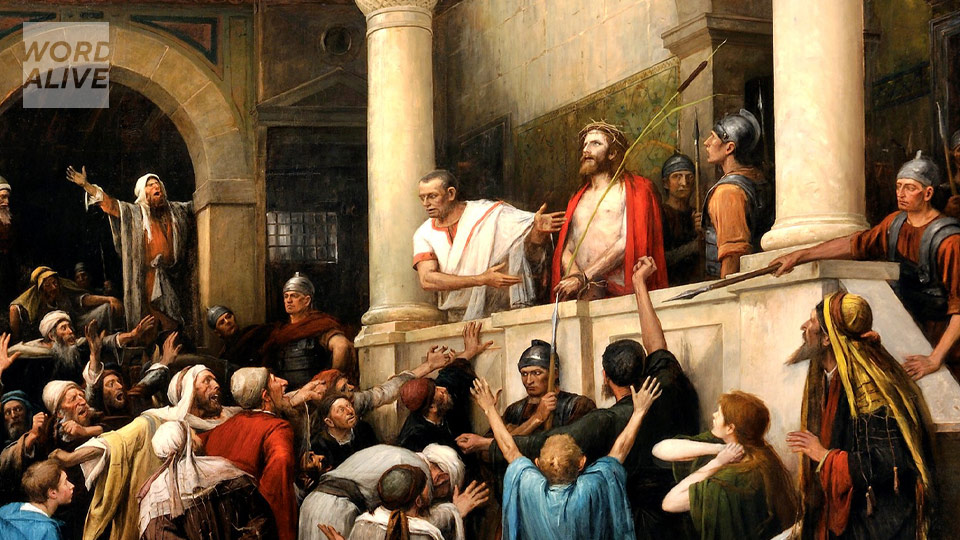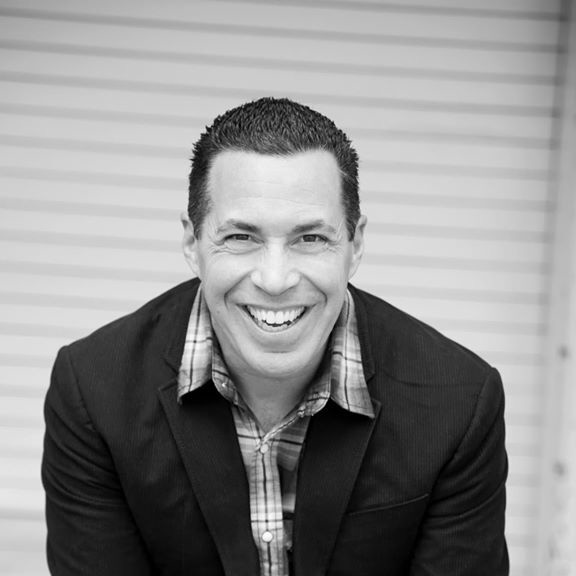

We are called to imitate Jesus, not Pilate | Word Alive
Steve Angrisano
Friday, April 3, 2020

Pilate presents Jesus to the crowd in this detail from the painting Ecce Homo! by Mihály Munkácsy (Source: Wikimedia Commons)

We are called to imitate Jesus, not Pilate
A reflection for Palm Sunday, Year A
by Steve Angrisano
I’m always intrigued by Pontius Pilate’s turmoil in the Gospel accounts of the Passion (and I encourage you to read all of them this week). Historically, Pilate is not known to have been a very compassionate leader, and it’s extremely likely that the death of one man would not ordinarily have troubled him. Clearly, something different is going on here. I believe that one of the reasons Pilate is so troubled is that there actually is something perceptibly different about Jesus. Regardless, he knows Jesus to be innocent and he knows that the Jewish leaders are making a political play, acting out of jealousy. By law, they can’t do for themselves what they are asking him to do, namely to crucify Jesus. Roman law prohibits the Jewish leaders from executing anyone. That is really the only reason Pilate is involved. It may well be that the Pharisees’ power play, threatening Pilate by implying that he isn’t loyal to Caesar if he doesn’t execute Jesus, is the main reason he is so clearly frustrated. He’s being played by people lower than him. This is someone else’s political battle, and he is being used in it. Jesus didn’t do anything to deserve death, and though Pilate knows that, he’s getting boxed in. In one Gospel account, his wife also ominously asks him to stay out of the affair altogether. Jesus is a popular and captivating figure with many followers, perhaps including Pilate’s own wife. At any rate, whatever his mix of motivations, Pilate does not want to crucify Jesus. Ultimately, his fear of the mob and the Jewish authorities wins out over what he clearly believes to be the right decision. I actually think that most of us can relate, at least in a small way, to what Pilate was feeling. We may have a strong sense of what is the “best” thing to do in some situation, yet there are consequences and pressures that make it hard to choose what we know to be right. In fact, sometimes there are even enough “good” things that will happen when we do the “wrong” thing that we rationalize ourselves into it. But the one thing I’ve noticed in my own life is that I don't actually feel free or victorious when I make that kind of choice under those kinds of circumstances. Compare that to Jesus’ words in the garden just a few paragraphs earlier: “Then he said to them, ‘My soul is sorrowful even to death. Remain here and keep watch with me.’ He advanced a little and fell prostrate in prayer, saying, “My Father, if it is possible, let this cup pass from me; yet, not as I will, but as you will.” This is one of the most underestimated moments in Scripture. The God of the universe sweating blood, crying out to his Father in Heaven, “Abba!” best translated as: “Daddy!” Please don't let this happen to me! But still, your will be done. Listen, we've all heard this story many times over. Perhaps this year, instead of simply recalling the chronological order of events, we recognize that one of the most significant lessons Jesus is teaching us in the Passion is His absolute and total surrender to the Father – even when it seemed there had to be other ways, He trusted in the Father’s way. Even when we can rationalize the good things that might come from our way, perhaps we might have the strength to trust in God’s way – to see that true freedom only comes in trusting in God’s goodness and not in the frailty of our own understanding, regardless of what we think might happen. Don't be like Pilate. Imitate Jesus. As it turned out, under the appearance of worldly suffering came eternal redemption, salvation, and everlasting life! How powerful, if today, we offered up the greatest hardships of our own lives and prayed the same words that Jesus prayed, “Please let this cup pass over me. But Father, more importantly, I trust in you. Your will be done.”The readings for Palm Sunday, Year A, are Matthew 21:1-11 Isaiah 50:4-7 Philippians 2:6-11 Matthew 26:14-27:66
 Steve Angrisano is a singer, songwriter, and storyteller, and one of the most effective and versatile ministry leaders in the Church today. Young and old alike embrace the passionate message of faith, hope and love woven throughout his music and storytelling. Always rooted in a spirit of humility and faithfulness, Steve’s easy, honest style of ministry is born from who he is: a committed witness to the life and love of Jesus Christ.
Steve Angrisano is a singer, songwriter, and storyteller, and one of the most effective and versatile ministry leaders in the Church today. Young and old alike embrace the passionate message of faith, hope and love woven throughout his music and storytelling. Always rooted in a spirit of humility and faithfulness, Steve’s easy, honest style of ministry is born from who he is: a committed witness to the life and love of Jesus Christ.Related Articles:
<<













